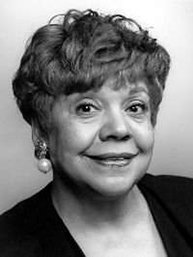by Ron Reosti & Chris Collins
September 12, 2014
Claudia House Morcom, an important figure in the civil rights movement in the South during the 1960s, a significant member of the progressive Black movement in Detroit and an activist in the fight for human rights internationally as well as in the United States, passed away on August 17, 2014 at age 82.
We each met Claudia before we met each other. She hired Ron in 1967 at Neighborhood Legal Services, which she had just taken over as the first Director in Detroit. As a young National Lawyers Guild attorney, he knew that Claudia had been part of the Goodman Law Firm, the leading civil rights firm in Detroit, and had run the NLG’s Southern Law Project in Mississippi during the Klan’s murderous campaign against Civil Rights workers and protestors.

Chris met Claudia in 1972, when Claudia became an Administrative Law Judge at the Bureau of Worker’s Compensation where Chris had worked for four years. They worked together until 1980. They became friends and soon discovered that they were neighbors as well.
Claudia introduced Chris to a number of people who later became close friends. She also was a wonderful yoga instructor who taught a group in a room at the Jeffersonian apartment building where she lived. She often joined a group for a bike ride around Belle Isle. She shared her love of jazz as well.
With Claudia, one never learned of her varied and many accomplishments in the field of civil and human rights from her. You learned of her activism when she was being honored over and over throughout the years. She was an inspiration and a silent mentor to Chris and other young women who were fortunate to know her.
When Claudia took over the National Lawyers Guild in Jackson, Mississippi, she arrived the day after Michael Schwerner, James Chaney and Andrew Goodman, civil rights workers, had disappeared. Claudia ran that office for two years facing up to Klan violence and organizing legal assistance in the South. When she returned to Detroit to take over the Neighborhood Legal Service program, she also played an active part in the antiwar movement, taking on the leadership of a Detroit ballot initiative to end the Vietnam War.
When Claudia became the Director of NLS, she staffed it not only with young idealistic attorneys but also with a smaller number of older white and Black attorneys who had been part of an earlier struggle for social justice. The chance to work with these veterans of earlier struggles was itself an education for the younger attorneys.
Claudia gave us a lot of freedom and encouragement to challenge the legal status quo and always backed us when the legal establishment complained, including when she ordered an all-out mobilization of NLS attorneys during the 1967 rebellion and when the NLS represented community, tenant and welfare rights organizations in their protests of the conditions they faced.
Claudia was a judge from 1972 until 1998, first at the Workers’ Compensation Bureau and later at the Wayne County Circuit Court. As a judge she was respected by her peers, and more importantly, was always sensitive to the litigants who appeared before her.
During this entire time, Claudia continued to be politically active. She was a founding executive board member of the National Alliance Against Racist and Political Repression, and one of seven judges at the International People’s Tribunal of Conscience In Support of the Vietnamese Victims of Agent Orange.
She was also active in many other international organizations, including the International Association of Democratic Lawyers in which she fought for human rights in Nicaragua, South Africa and Palestine. She also was concerned with U.S. human rights violations in Guantanamo, Iraq, Afghanistan and in the United States including violations against the citizens of New Orleans in the aftermath of Hurricane Katrina.
Meanwhile, Claudia somehow found time to host a Saturday morning jazz radio show (which we never missed) as “The Reverend, Doctor, Judge Claudia.”
Claudia’s accomplishments testify to her courage, intelligence, dedication, energy and humanity. In addition, she was a warm and wonderful friend. We both struggle to find words that fully convey her warmth and joie de vivre that would make any occasion better when we ran into her, whether a political gathering, social event or just a lucky occurrence, and bring smiles to our hearts. Claudia had that effect on people.
Against the Current interviewed Claudia Morcom earlier this year for our 50th anniversary coverage of Freedom Summer, and previously in 2002 about her experience at the 2001 World Conference Against Racism in Durban, South Africa, an important event that was almost entirely forgotten in the wake of the September 11, 2001 terrorist attacks.
